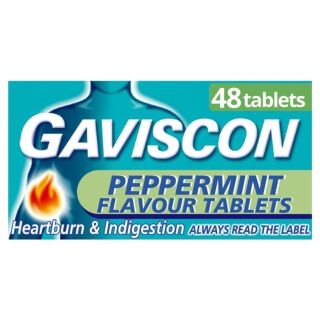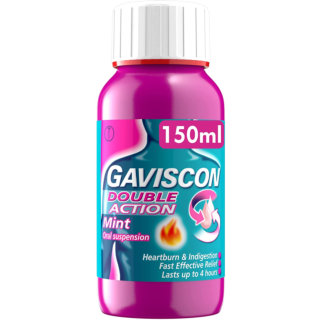Indigestion - Causes, Symptoms & Treatment

Indigestion is a feeling of pain or discomfort in the upper abdomen or behind the breast bone. It can sometimes feel like a burning sensation and can be accompanied by other symptoms such as bloating and belching.
Many people experience indigestion at some point in their lives, usually triggered by eating or drinking certain foods and drinks. Occasional indigestion is not concerning and there are ways to reduce the symptoms.
However, some people can experience chronic indigestion known as gastro-oesophageal reflux disease (GORD) or in rare cases, a more serious underlying condition may cause indigestion.
Symptoms
It’s common for symptoms to start soon after eating or drinking due to irritation of the stomach lining or oesophagus. You may feel discomfort, a burning feeling or pain in these areas (upper abdomen). These are the main symptoms of indigestion. Other symptoms of indigestion include:
- Bloating or feeling uncomfortably full
- Nausea or vomiting
- Belching and flatulence
- A bitter taste in your mouth
- Bringing up food or fluids (reflux)
Indigestion doesn’t usually cause stomach ache or backache; this is likely to be something else like trapped wind or constipation. Indigestion shouldn’t cause shortness of breath, sweating or dizziness.
If you have these symptoms accompanied by pain in your chest, jaw, neck or arm it may be a sign of a heart attack and you should seek emergency medical help. The two conditions can be mistaken for each other as the symptoms overlap.
Causes of indigestion
Gastro-oesophageal reflux disease (GORD)
Our stomach produces acid, but sometimes this acid can irritate the lining of the stomach, the oesophagus and the top of the bowel. This causes the unpleasant symptoms of indigestion.
GORD is a condition that happens when part of the oesophagus weakens and stops working as it should, causing recurring bouts of indigestion.
At the bottom of the oesophagus is a ring-shaped muscle called the oesophageal sphincter that opens and closes to let food into your stomach and stops acid from leaking out. In GORD, the muscle weakens which allows acid to leak back up the oesophagus (also known as acid reflux) causing a burning sensation in the chest as well as many other symptoms of indigestion.
If you have persistent indigestion, it’s quite possible you may have GORD, and in some cases, a doctor may perform tests such as an endoscopy (a small camera inserted through the mouth to look inside the body) to confirm this.
Hiatus hernia
A hiatus hernia can cause GORD and symptoms of indigestion. It describes the stomach pushing up into a weakened diaphragm which can stop the oesophageal sphincter from working properly. The leaking stomach acid irritates the oesophagus and causes indigestion.
Stomach ulcer
Open sores that appear in the stomach or intestines are known as stomach ulcers or duodenal ulcers if in the intestines, or they may collectively be known as peptic ulcers.
Stomach ulcers are caused by damage to the stomach lining, usually from an infection. This irritation to the stomach lining causes indigestion.
Helicobacter pylori infection
The most common infection that causes stomach ulcers mentioned above is a bacterial infection known for short as H. pylori. It usually develops due to poor hygiene, for example, not washing your hands properly after using the toilet or when preparing food.
In a lot of cases, an H. pylori infection doesn’t show any noticeable symptoms. However, if a stomach ulcer is a complication of this infection it can cause indigestion.
Stomach cancer is another complication of H. pylori and a possible cause of indigestion, but this is rare.
Obesity
The pressure around the abdomen caused by excess weight increases the chances of developing GORD and acid reflux.
What can trigger indigestion?
About of indigestion can be brought on by a number of things and isn’t necessarily caused by the above medical conditions. Here are some common triggers of indigestion.
Stress and anxiety
Feeling stressed or anxious can cause a range of physical symptoms, including indigestion. It’s thought that high levels of stress and anxiety may increase stomach acid production and hinder the oesophageal sphincter from working properly, causing acid reflux.
Likewise, living with recurring indigestion can make a person feel stressed or anxious which worsens indigestion.
Medication
Certain types of medication can affect the digestive system and stomach. Non-steroidal anti-inflammatory drugs (NSAIDs) such as ibuprofen and aspirin list stomach ulcers as a side effect.
This is more likely to happen if you regularly use this medication, but as we’ve discussed, stomach ulcers cause symptoms of indigestion. If you have or have ever had stomach ulcers it’s recommended to avoid using NSAIDs as these will aggravate peptic ulcers, and instead use alternative painkillers such as paracetamol.
If taking NSAIDs is necessary, your doctor may prescribe these alongside a type of medication known as a proton pump inhibitor to reduce stomach irritation from NSAIDs and protect against stomach ulcers.
High blood pressure medicines such as beta blockers and calcium channel blockers are also known to cause indigestion.
Eating and drinking
Certain foods and drinks, in addition to eating habits, are the biggest indigestion triggers. Overeating and eating too fast can cause indigestion symptoms such as bloating and gas build-up, as well as acid reflux. Eating slower can help you digest food better and eat less.
Some food and drink can increase stomach acidity such as high-fat foods and carbonated drinks, whilst some can relax the oesophageal sphincter affecting its ability to stop acid from escaping from the stomach.
Here are some common foods and drinks that can cause indigestion:
- Greasy foods such as those that are fried
- Saturated fats such as butter, cream and cheese
- Spicy foods
- Chocolate
- Citrus juices
- Tomato
- Caffeinated drinks such as coffee
- Soda and carbonated drinks
Smoking and alcohol use
Tobacco and alcohol can trigger indigestion. Alcohol increases the production of acid in the stomach causing irritation. Cigarettes cause the oesophageal sphincter to relax which can lead to acid reflux as the muscle may not close properly to keep acid in the stomach.
As well as this, smoking decreases saliva production. Saliva contains bicarbonate which naturally helps to clear acid from the oesophagus.
If smoking and drinking alcohol regularly trigger your indigestion, avoiding these substances entirely is the best way to prevent indigestion and the complications associated with it.
When to see a GP
Your pharmacist is your first port of call for seeking advice or treatment for your indigestion. Indigestion is usually mild and will clear on its own, however, if you’re experiencing frequent bouts of indigestion or you’re in a lot of pain, a pharmacist can help.
If your symptoms suggest there may be an underlying condition or health problem, your pharmacist may refer you to your GP for further investigation.
How to treat indigestion
There are a number of ways to treat recurring indigestion and ease the temporary symptoms. Treatment includes lifestyle changes, medicines and natural remedies for indigestion relief.
Medical treatments
To treat indigestion there are four types of effective medication available, these are known as antacids, alginates, proton pump inhibitors (PPIs) and H2-receptor antagonists.
Antacids and alginates are used for the occasional bout of indigestion, and they relieve symptoms for a few hours. They’re available in tablet and liquid form and some can be bought without needing to see a pharmacist or doctor. You can find some popular remedies, like Gaviscon, listed above.
Antacids neutralise stomach acid and stop irritation, whilst alginates form a barrier over the contents of the stomach to prevent acid from leaking up through the oesophagus (acid reflux).
PPIs and H2-receptor agonists are prescribed by a pharmacist or GP if you’re experiencing persistent indigestion and antacids and alginates have been ineffective.
Both PPIs and H2-receptor agonists work by limiting acid production in the stomach. They may take longer to start working, however, their effects are longer lasting.
Natural remedies
As many of us will experience indigestion occasionally, you may opt for a natural remedy if your symptoms are mild. Natural home remedies may not be suitable if you have stomach ulcers or GORD.
You should always seek medical advice before trying these remedies, particularly if you’re taking medication for your condition. In small amounts, the following may help to reduce stomach acid or relieve digestive discomfort such as nausea and bloating. Most of these ingredients can be taken in the form of tea for easier consumption.
- Peppermint tea
- Reduces digestive discomfort due to its antispasmodic effect (relieves muscle spasms in the gut)
- Shouldn’t be used if your indigestion is caused by acid reflux
- Chamomile tea
- Reduces stomach acid
- Liquorice root
- Reduces inflammation and relieves symptoms of indigestion
- Ginger
- Reduces stomach acid
- Take in small doses
- Lemon
- Neutralises stomach acid due to its alkaline effect
- Fennel seed
- Health claims include improved digestion and an antispasmodic effect which relieves stomach cramping and other gastrointestinal symptoms
- Baking soda (sodium bicarbonate)
- Neutralises stomach acid
You may find some of these substances in supplements, too. Probiotics in particular are used more regularly to maintain and improve digestive health.
Probiotics are live bacteria and some of their health benefits include an improvement in acid reflux and GORD symptoms, as well as a decrease in side effects associated with taking proton pump inhibitors.
Research is still ongoing when it comes to probiotics, but trying a supplement alongside the lifestyle changes listed below is likely to have more benefits than risks.
Lifestyle changes
If indigestion is regularly affecting your life, you may need to make some changes to help your condition. The following lifestyle changes may be enough to improve or stop indigestion, or they may be used alongside the treatments above.
- Weight management. If excessive weight is causing your indigestion, reducing your weight will help ease the pressure on your stomach and lower your risk of acid reflux.
- Develop good eating habits. Eating slower and smaller portions will not only help manage your weight, it will also slow down digestion causing less irritation to the digestive tract.
- Don’t go to bed on a full stomach.
- Elevate your head whilst sleeping. Rather than using pillows to do this, it’s best to physically raise the head of the bed and let gravity keep acid in your stomach. Many people find acid reflux is worse when they lie down; raising the bed so that your head and chest are higher than your feet can help ease this.
- Stop smoking and reduce alcohol consumption. These are well-known indigestion triggers.
- Wear loose-fitting clothing. Tight clothing around the stomach adds pressure and may push acid up the oesophagus.
How to prevent indigestion
Getting to know what your triggers are and avoiding this is the best form of prevention. A food diary is a great way to understand your condition and keep track of what triggers your indigestion and at what times of the day it happens. Log what you eat, the time you eat and any symptoms you’re experiencing in your diary.
Living a generally healthy lifestyle will help keep indigestion at bay. Stopping smoking, for example, is a sure way to keep bouts of indigestion to a minimum. Practice good eating habits, eat a balanced diet and drink plenty of water, and maintain a good weight to reduce your risk of developing indigestion.
Finally, manage your stress. There is a direct connection between your brain and your gut, and when you’re stressed you’ll likely feel a range of digestive symptoms, including indigestion. Improving your quality of sleep, doing more of the things you love and finding your coping mechanisms are all ways to keep stress levels down and indigestion at bay.







